Though it seems clear that newly appointed Islamic Revolutionary Guards Corps Quds Force (IRGC-QF) commander Brig. Gen. Esmail Qaani will struggle to fill the shoes of his predecessor, analysts say he is likely to steer a similar course.
Qassem Soleimani, killed January 3rd in Baghdad by a US airstrike, was widely perceived as the most powerful man in Iran, after Iran's Supreme Leader, Ali Khamenei.
Qaani, who was appointed by Khamenei immediately after Soleimani's death and is expected to provide continuity rather than change, does not have and is not likely to achieve similar status inside or outside Iran, analysts told Al-Mashareq.
Despite the iron fist and authority he wields in pursuing the Iranian regime's external agenda, Qaani is unlikely to be able to contain the growing challenges the IRGC and its proxies face in conflicts in which they are embroiled, they said.
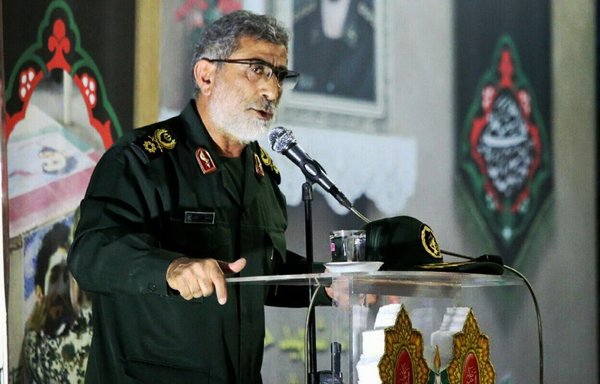
Newly appointed IRGC Quds Force commander Esmail Qaani is seen here in an image posted online after Soleimani's death on January 3rd.
Soleimani was an extraordinary figure in that he answered to no one except Khamenei, military and strategy analyst Hatem al-Falahi told Al-Mashareq.
He was seen as very powerful by virtue of his close and trusted relationship with the supreme leader, and was able to parlay this influence into building a vast network of pro-Iran agents in the region who followed his orders.
Soleimani's death "caused much confusion, particularly with regard to the relationship and management of the Iran-affiliated militias", al-Falahi said.
Qaani has to "fill the gap that was left by his predecessor and figure out how to keep the regime intact in the face of popular opposition to its influence in Iraq, Lebanon and Syria", he said.
He also has to figure out how to maintain a firm grip on the militias, al-Falahi added, noting that Qaani's ability to unite the militias is questionable.
Regime faces public anger
As economic conditions deteriorate inside Iran, as a result of poor governance and sanctions, the Iranian people are facing rapidly worsening conditions.
But protests against these conditions have been met with brutal suppression that has only served to increase resentment against the regime, al-Falahi said.
Faced with public anger, Iran's leaders, including Qaani, have been maintaining a hostile tone towards the West, said Issam al-Fayli, who teaches politics at al-Mustansiriya University.
This is in hopes that constant references to Soleimani's assassination will distract Iranians from their problems, and will buy the regime time to avoid "a downward spiral", he told Al-Mashareq.
While Iran's leaders might prefer to avoid escalation with the international community at this difficult time, al-Fayli said, Iran's relationship with its external agents is still on the same track that Soleimani followed.
Qaani, who is known for his bigoted approach vis-à-vis the regime's ideology, which he has adhered to and defended for decades, is now trying to fulfill Soleimani's mission, al-Fayli said.
Militias pressured into loyalty
On January 13th, Qaani and Iraqi militiaman-turned-cleric Muqtada al-Sadr met in Qom with the most senior leaders of Iran-backed Iraqi militias, with the goal of forming a "resistance council" against the foreign presence in the region.
Iran's leaders, and specifically Qaani, intended for this "reconciliatory" meeting to signal that the Iranian regime is "still influential and in control of the [loyal] armed factions", al-Fayli said.
These factions, all of which are facing similar pressure amid recent regional escalation, were quick to respond to Qaani in what was effectively the first test of his ability to follow through with the mission Soleimani started, he said.
These are the agents Iran is using in the fight to defend its existence according to its ideological and political prism, political analyst Khattab al-Azzawi told Al-Mashareq.
It is clear these factions have shouldered the burden of this responsibility and made the decision to remain under Iran's auspices, he said, as the demise of any side means the demise of all.
"Like his predecessor, Qaani is a hardliner who rejects the idea of surrender and sacrificing gains or making concessions," al-Azzawi said.

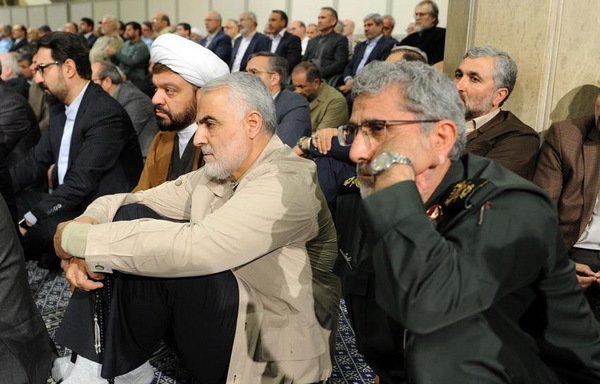
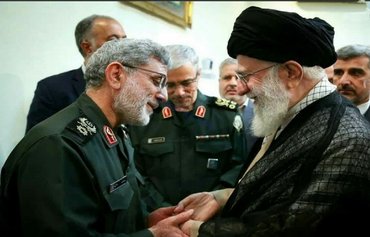
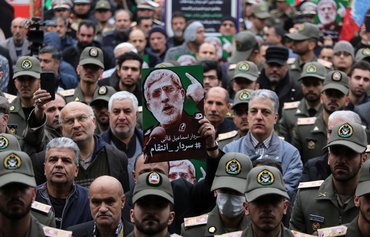
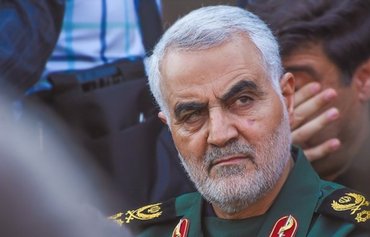




My name is Mohamed. I want to form a faction affiliated with Quds Force, and I would like to have support. Can you help?
Reply2 Comment(s)
Hi. This primitive interpretation of yours shows your ignorance of Iranian creeds. Since the dawn of Islam, Iranians have been the pioneers of the resistance front, including scientifically, spiritually, economically and militarily. And it's never predictable enough for you to analyze it with your first grade elementary school knowledge. You are an obedient of America, and you are worse that the Umayyads, Abbasids and the Khawarij. And, you are always insignificant, while the Iranian people are always proud and dignified. Peace be upon Islam Peace be upon Khomeini God willing, and by relying on God, we will deliver this revolution to the hands of the Imam of the Age (may our souls be sacrificed for him) Curse on you, fake Muslims
Reply2 Comment(s)